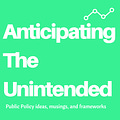This newsletter is really a public policy thought-letter. While excellent newsletters on specific themes within public policy already exist, this thought-letter is about frameworks, mental models, and key ideas that will hopefully help you think about any public policy problem in imaginative ways. It seeks to answer just one question: how do I think about a particular public policy problem/solution?
PS: If you enjoy listening instead of reading, we have this edition available as an audio narration on all podcasting platforms courtesy the good folks at Ad-Auris.
Not(PolicyWTF): Acknowledging State Failures
This section looks at egregious public policies. Policies that make you go: WTF, Did that really happen?
- RSJ
We rarely miss an opportunity when the political or the administrative class make an announcement or draft a policy that goes against our ideology of common sense. So, it is only fair we write about the rare occasion when someone gets things right. Even if it is only in a speech.
Something New
This was that week. Here’s our PM speaking in the Rajya Sabha about the state spreading itself too thin and the unfortunate demonisation of the private sector in our polity. The Print reports:
While doffing his hat to the private sector Wednesday for its contribution to the growth and development of the country, Modi questioned the “power centre we have created in the country by handing over everything to babus”.
“Sab kuch babu hi karenge. IAS ban gaye matlab woh fertiliser ka kaarkhana bhi chalayega, chemical ka kaarkhana bhi chalayega, IAS ho gaya toh woh hawai jahaz bhi chalayega. Yeh kaunsi badi taakat bana kar rakh di hai humne? Babuon ke haath mein desh de karke hum kya karne waale hain? Humare babu bhi toh desh ke hain, toh desh ka naujawan bhi toh desh ka hai,” Modi said.
(Babus will do everything. By dint of becoming IAS officers, they’ll operate fertiliser warehouses and also chemical warehouses, even fly aeroplanes. What is this big power we have created? What are we going to achieve by handing the reins of the nation to babus. Our babus are also citizens, and so are the youth of India.)
I don’t know when words of this nature were last spoken in the Parliament. Maybe Minoo Masani made a few speeches of this kind during the heyday of the Swatantra Party. But to have a hugely popular PM, one with the rare ability to make the public do his bidding, speak these words suggests a shift in direction that was long-awaited.
Anyway, that speech came on the back of weeks of protests against farm laws that had morphed into Ambani-Adani bashing. The names don’t matter. A few decades back it was Tata-Birla. We have also had the usual reports about how the pandemic has exacerbated inequality purely on the basis of notional wealth created by a rising stock market. And there have been bizarre articles devoid of any economic logic as well.
These are familiar grounds. We have framed it as growth or redistribution trade-off in a few of our past editions. Like many others, we have argued India needs growth before worrying about redistribution. We have also done our best to dispel a notion deep within our psyche. That we are in some kind of a giant zero-sum game and someone winning must mean someone is losing.
Is that it?
Or is there more that can be brought into this debate?
The state must aim to foster conditions in a society that advance the well being and prosperity of its members. No one argues with this goal. The fundamental question of public policy then is what are the means it must adopt to create this environment?
Should the state aim for equality among its member through redistribution of its resources? That there can be no harmony or stability in a society unless there’s fairness and equality among its members.
Or, should the state guarantee the fundamental rights of the citizens, provide for law and order that safeguards them against anarchy and then get out of their way. People don’t want the state to legislate for some notion of equality that’s in its mind. They want freedom and security. That would do. Thank you very much.
The old Rawls versus Nozick debate
Rawls’ seminal A Theory of Justice argued for justice as fairness (the title of a later book of his) with two key principles. First, the greatest equal liberty principle which proposed people’s equal basic liberties should be maximised. Rawls conceived of an artificial construct called the original position - a state where each one of us has to decide on the principles of justice behind a veil of ignorance. That is we are blind to any fact about ourselves; we are ignorant of our social position, wealth, class or any natural attribute. Behind this veil, Rawls asked how would we choose the principles of justice for the society?
For Rawls, the logical choice for all of us would be what he called the maximin strategy that would maximise the conditions of those with the minimum. This gave him his second principle - the social and economic inequalities should be arranged only to provide the greatest benefits to the least advantaged.
Nozick agreed on the liberty principle with Rawls. But he had a strong disagreement on the idea of maximin. For him, any distribution of wealth (or holdings as he termed it) is fair if it comes about by a just and legitimate distribution. He defined three legitimate means. First, where the acquisition of a property that is unowned is achieved through the enterprise of a person and this act doesn’t disadvantage anyone else. Second, a voluntary transfer of ownership between two consenting entities. And third, a redressal of a past injustice in acquiring or transferring the holdings. Anyone who has acquired wealth or holdings through these means is morally entitled to them. Any attempt by the state to redistribute it would be a serious intrusion on the liberty and, therefore, unjust.
So the goal to reach a patterned distribution of wealth had a problem at its core. Once you achieve such a delicate balance, how do you maintain it? Every random economic act from there on will disturb the balance. And such random acts will be too many for the state to control. The state will then have to constantly meddle in the lives of its citizens to redress the balance. This meddling will spiral out of control soon till the state takes over the lives of its citizens completely in a totalitarian future. For Nozick state can act to redistribute only with the consent of its citizens. If people voluntarily redistribute their wealth (means #2) to others and want to design a society on that principle, they are free to do so. But the state cannot impose it against their will.
To me, the first point of agreement between Rawls and Nozick is critical from an Indian context - the liberty principle or the basic freedoms that must be guaranteed to every citizen. These cannot be violated or the absence of such freedoms should not be tolerated even if doing so in some ways increase the aggregate prosperity of the society or help the poor. Before we argue about redistribution, we must ask if we have created a society that satisfies the greatest equal liberty principle. That must be our first goal.
Postscript:
I don’t remember when I lost my faith in the ability of the state to improve the lives of its people. Perhaps there wasn’t an exact moment. Growing up the state was all around me. I spent most of my childhood in what used to be called a ‘colony’. One of the many that dotted the semi-urban Indian landscape in the 80s. A small industrial township whose heart beat to the rhythm of the government-owned factory at the centre of it. My school, my playground, the hospital and even the temple were all run by the state.
The state then subsidised a world-class higher education programme for me. At the turn of the millennium, I entered the workforce. If you had cut me then I would have bled state.
Over the next two decades, I lost my faith. Gradually. Two factors led to it. One, I understood the privilege that allowed me to take advantage of the generosity of the state. The accident of my birth - a savarna Hindu male born in the mid-70s to educated parents - seemed to play a disproportionate role in my relative success. I noticed the state could barely enable others to do well who weren’t born to privilege like me. They didn’t have the freedom that I took for granted. The state was absent to those who needed it the most. Two, the state had tremendous confidence in its capabilities that, unfortunately, was inversely related to its actual performance. This led the state to have its finger in every pie with poor outcomes. The state cast its long shadow in everything I did. It was present everywhere.
The Indian state was simultaneously ‘omnipresent’ and ‘omniabsent’ depending on who you were. One thing was common though. The consequences of both were terrible.
Once I saw through the nature of the state, I couldn’t ‘unsee’ it. The sorry spectacle of the flailing state, as Pritchett called it, was all around me. I wondered how others couldn’t see it. Why despite the overwhelming evidence do we look for the state to solve problems where there was no apparent market failure? Why did the state not narrow its focus on things that really mattered and build capacity in them instead of spreading itself too thin? Whenever I read about the argument for state to get into further redistribution, I cannot help but ask how does the end result of this patterned distribution look like. Is there really any end to it? Why should we let it meddle even further into our lives trying to get the redistribution right? Why can’t the state focus on ensuring the privilege I was born with is made available to all its citizens? That would fulfil the first principle agreed upon by both Rawls and Nozick.
The rest is just criminal overreach.
PolicyWTF: Compulsory Philanthropy
This section looks at egregious public policies. Policies that make you go: WTF, Did that really happen?
— Pranay Kotasthane
We in India love our oxymorons. Back in college days, we had “compulsory elective” courses. Similarly, many government interventions are what my senior colleague Narayan Ramachandran calls “voluntary mandatory” — voluntary according to the law but mandatory in practice. The most common example is the requirement to submit the “voluntary mandatory” Aadhaar for accessing any government service.
To this venerable tradition, add one more - “compulsory philanthropy”. Philanthropy implies choice. It is an act of generosity, of empathy. But that’s not how the State sees it. Under the name of Corporate Social Responsibility (CSR), philanthropy was made mandatory starting in 2014.
That move didn’t go as well as the State desired (surprise surprise!). One, there wasn’t just enough CSR expenditure forthcoming. The highest total CSR expenditure, clocked in FY19, was just about ₹18,000 crores. For reference, the union government earned ₹20,000 crores in FY20 through the Education & Health Cess alone. Two, new frauds emerged, with some companies funding dubious CSR projects that clawed money back to their promoters (duh!). And three, and this is the most important one. Fearing the wrath of the State, many companies spent their CSR funds on the “safe” subjects such as primary education and health, precisely the areas where the State’s role is supremely important. In other words, this had the effect of allowing the State to outsource its core functions.
Given these problems, the union government notified changes to the CSR rules last month (you can read the gazette notification here). These changes are all too familiar — increase disclosure requirements, mandate impact assessments, and of course, generate more accounting work. To balance it out, there are some positives too — a regimented list of subjects that qualify for acceptance of CSR has been replaced with a negative list, while the CSR provision has been decriminalised (phew, small mercies!).
I will evaluate the impact of these new rules at a later point in time. For now, I want to return to the purpose of CSR and debunk three common arguments made in favour of mandating philanthropy.
The first argument is that CSR is just corporate tax by another name, so why bother.
I agree that once you make philanthropy mandatory and statutory — India is the only country in the world to do so — CSR becomes tax-like. And yet, it is only worse. Anyone doing business in India will attest that it’s impossible to do so without breaking one of the thousands of rules and laws that demand compliance. Now with new rules and additional compliance requirements, CSR becomes another tool in the hand of the State to corner businesses and worse still, create new corruption opportunities.
There are three costs associated with any tax-like mechanism: the cost of collection, the cost of compliance, and the cost of market distortion. Mandating CSR is a tax in which the cost of compliance is way too high for it to make any economic sense. If the objective is to mobilise resources for social welfare, there’s a much better tax-like mechanism — it goes by the name ‘tax’.
The second argument is that look, many great things have happened because of CSR — lakes are being maintained, schools have started functioning, and drinking water is being provided. So why not get companies to do even more?
I call this argument the cost-blind fallacy. Any expenditure worth ₹18,000 crores is, of course, going to do some good things. In a complex system, even the worst of public policies always have some positive benefits. That doesn’t imply that anything goes. Since every policy also has a cost attached to it, it’s benefits need to be compared with the costs incurred.
So, has anyone asked what were the explicit and implicit costs of mandating CSR? Does it make the State more complacent having outsourced its work? What are the compliance costs for companies? Does it make companies already involved in philanthropy of their choice scale back their efforts to satisfy government paperwork? Without an answer to these questions, recounting a few successful examples of CSR is poor reasoning.
The third argument is that companies spending money on social welfare will be more efficient at achieving the required outcomes than our already stretched-out State. A quote from this Business Standard report gives a good idea about this line of thinking:
“India has huge inequalities in society and there is much to do about our environment. It is not possible or fair for the government to tackle it alone. It would also take many, many years to see the results. The reason CSR law was brought in was to make industry an equal and responsible stakeholder in the development process.”
This argument falls flat on two counts.
One, development successes are not achieved by “equal” stakeholders trying to fix each other’s failures but by each stakeholder doing well at what it is supposed to do in the first place. It’s not about ‘everyone doing everything’ but about ‘everyone doing at least one thing well’.
Previously, I have argued how hyper multi-objective optimisation lead to poor institutions and policies. Let the objective of the market be to bring prosperity and create livelihoods. Burdening it with social welfare conditions will lead to a situation where it achieves neither of the outcomes.
Two, to think that companies can easily plug government failures is deluding ourselves. All of CSR expenditure in FY19 less than one-third of union government expenditure on MNREGS alone. It’s only the state that has the resources and stamina to provide public goods. It must be held accountable for that. No amount of philanthropy can be allowed to wash the State its hands of the results.
In sum, compulsory philanthropy is akin to the Indian State reprimanding Markets and Society by saying: I won't do what I'm supposed to but why the hell aren't you two doing what I'm supposed to do?
India Policy Watch: Resources for Budget Analysis
Insights on burning policy issues in India
— Pranay Kotasthane
The budget season is upon us. After the union government budget, states — which account for nearly sixty per cent of all government spending in India — are in the process of planning their next financial year.
I strongly believe that financial statements of governments require closer scrutiny. Without better analysis of incomes and spending, we cannot expect government accountability. Add to that, this is one activity that public policy enthusiasts can do from the comfort of their homes.
So in this edition, I want to share some publicly available resources that can help you understand government finances better. Apart from state and union budget documents, there are many other data sources scattered on websites of different government bodies in true Yes Minister fashion.
Hopefully, this non-exhaustive list will be of some help.
Primers
If you want to understand the basics of a government budget, start with PRS Legislative Research’s Overseeing Public Funds - How to scrutinise budgets document. The portal OpenBudgetsIndia also has a good primer here.
If you want to analyse the budgets of your state, we have a three-part YouTube tutorial here: 1, 2, and 3.
Public Finance Databases
If you want to know the stated outputs and outcomes of union government schemes, read the output outcome framework document released with the other budget outlay documents.
If you want detailed information on union government spending arranged by minor heads, the Controller General of Accounts releases finance accounts data every year.
The Department of Economic Affairs releases an Economic and Functional classification of the union government budget.
If you’re on the lookout for the combined expenditure of union and state governments on areas such as research, health, or education, look at the Indian Public Finance Statistics.
If you are looking for information on disinvestment of union government-owned public sector units, the Bombay Stock Exchange maintains a database here.
The RBI maintains a database of all state government finances in one place, that too in spreadsheet form(!), here.
All supplementary grants made by the union government ministries can be found here.
If you know of more such documents that lie hidden in plain sight, send them to me. Let’s create an exhaustive public finance database index.
Quiz: An Election Manifesto Worth Reading
— Pranay Kotasthane
Election manifestos are boring laundry lists of promises and a litany of woes rolled into one. So let me present to you an exception.
Given below are excerpts from an election manifesto of a political party, written by a well-known Indian political leader. You need to name them. Send us your answers as comments to this post. If not, just enjoy this manifesto for its clarity and farsightedness. I’ve substituted XYZ for the name of the party in these excerpts.
On principles of the party
“The attitude of the Party in public affairs will be governed by the following principles:
It will treat all Indians not only as being equal before the law but as being entitled to equality and will accordingly foster equality where it does not exist and uphold it where it is denied.
It will regard every Indian as an end in himself with a right to his own development in his own way and the State as only a means to that end.
It will sustain the right of every Indian to freedom- religious, economic and political– subject to such limitations as may arise out of the need for the protection of the interests of other Indians or the State.
It will uphold the right of every Indian to equality of opportunity subject to the provision that those who have had none in the past shall have priority over those who had.
It will keep the State ever aware of its obligation to make every Indian free from want and free from fear.
It will insist on the maintenance of liberty, equality and fraternity and will strive for redemption from oppression and exploitation of man by man, of class by class and of nation by nation.
It will stand for the Parliamentary System of Government as being the best form of Government both in the interest of public and in the interest of the individual.
….
There may not be anything new in the Principles of the XYZ. They will be found in the manifestoes of most political parties. But there are two considerations which distinguish the Z from other Political Parties. The first consideration is that the principles of the Z are not adopted by the Z merely to look politically respectable or merely to delude the voters. They are natural to the Z. They are borne out of the social condition of the XY. The XYZ cannot exist without adopting these principles and without holding up to those principles and living up to them. The principles of the XYZ are the life book of the XYZ. They are not the external marks of a political faith. They are the outward register of the inward feeling. They are not cloak worne for the purpose of winning the election. Many parties may adopt these principles. But no party can be so true to the principles as the XYZ.”
On what the party’s policy would be like
“The policy of the Party will be to try to give effect to the principles set out above. The policy of the Party is not tied to any particular dogma or ideology such as Communism, or Socialism, Gandhism, or any other ism. The Party will be ready to adopt any plan of social and economic betterment of the people irrespective of its origin and provided it is consistent with its principles. Its outlook on life will be purely rational and modern, emperistic and not academic.”
The Party’s approach to increasing productivity
“For the purpose of increasing production, the XYZ will not be bound by any dogma or any pattern. The Pattern of industrial enterprise will be a matter regulated by the needs of the time and circumstances. Where national undertaking of an industry is possible and essential, the XYZ will support national undertaking. Where private enterprise is possible and national undertaking not essential, private enterprise will be allowed. Looking at the intense poverty of the people of this country no other consideration except that of greater production and still greater production can be the primary and paramount condition. A pre-conceived pattern of industry cannot be the primary or paramount consideration. The remedy against poverty is more production and not the pattern of production.”
On Kashmir
“On the Kashmir issue, the policy adopted by the Congress Government is not acceptable to the XYZ. This policy if continued will lead to a perpetual enmity betwen India and Pakistan, and the possibility of war between the two countries. The XYZ believes that it is essential for the good of both countries that they should be good and friendly neighbours. For this purpose the proper policy to adopt towards Pakistan should be based upon two considerations. (1) There should be no talk about the annulment of the partition of India. Partition should be accepted as a settled fact not to be reopened and that the two countries to continue as two separate sovereign States. (2) That, Kashmir to be partitioned– the Muslim area to go to Pakistan (subject to the wishes of the Kashmiries living in the Valley) and the non-Muslim area consisting of Jammu and Ladhak to come to India.”
On Foreign Policy
“The other centre of our foreign policy which has made other nations our enemies is China. India is made to fight her battle for entry in the United Nations Organisation as a permanent member thereof. This is an extraordinary thing. Why should India fight the battle of China when China is quite capable of fighting her own battle? This championing of the cause of Communist China by India has been responsible for the prevailing antagonism between India and America with the result that it has become impossible for India to obtain financial and technical aid from America.
…. India’s first duty should be to herself. Instead of fighting to make Communist China a permanent member of the U. N. O. India should fight for getting herself recognised as the permanent member of the U. N. O. Instead of doing this, India is spending herself in fighting the battle of Mao as against Chaingkai Shek. This quixotic policy of saving the world is going to bring about the ruination of India and the sooner this suicidal foreign policy is reversed the better for India. Before championing the cause of Asiatic countries, India must strive every nerve, must seek every aid to make herself strong. Then only will her voice be effective. This will be the line of Foreign Policy that the XYZ will pursue.”
Finally, cheers to a strong rejection of prohibition.
“From the point of equity, there is no justification for prohibition. The cost of prohibition is borne by the general public. Why should the general public be made to pay the cost of reforming a lakh or two of habitual drunkards who could never be reformed ? Why should the general public be made to pay the cost of prohibition when the other wants of the public such as eduction, housing and health are crying for remedy? Why not use the money for development plans? Who has greater priority, the Drunkard or the Hungry? There are pertinent questions to which there is no answer except arrogance and obstinacy. Whatever happens, the policy of prohibition must be reversed and this colossal waste of public money should be put a stop to and the resources utilised for advancing general welfare.”
HomeWork
Reading and listening recommendations on public policy matters
The Economist (Schools brief) on the three post-war liberals who strove to establish the meaning of freedom.
[Article] Prof Govinda Rao has the authoritative take on the 15th Finance Commission recommendations.
[Podcast] Pranay and Saurabh discuss GameStop, Rihanna, and the politics of radically networked societies on Puliyabaazi.
[Article] Bharat Karnad has another contrarian take on Tejas and India’s search for fighter aircraft.










#108 We Need To Talk About State 🎧